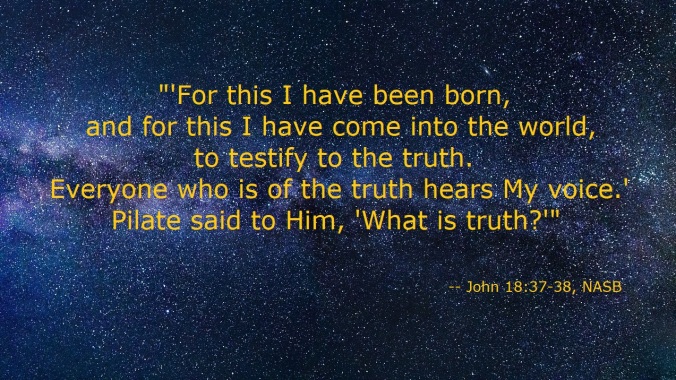“Go therefore and make disciples of all the nations…teaching them to observe all that I commanded you; and lo, I am with you always, even to the end of the age” (Matthew 28:19-20, NASB).
——————–
Contents:
1) An Eternal Perspective (Doy Moyer)
2) Regrets At Death (Bill Crews)
3) The Power of God to Salvation (Whit Sasser)
——————–

-1-
An Eternal Perspective
Doy Moyer
“Do not lay up for yourselves treasures on earth, where moth and rust destroy and where thieves break in and steal, but lay up for yourselves treasures in heaven, where neither moth nor rust destroys and where thieves do not break in and steal. For where your treasure is, there your heart will be also” (Matt 6:19-21, ESV).
Coming to grips with the reality of heaven is difficult for us when we are so focused on the earth. Learning to “look at the things that are not seen” because these things are eternal is a grand part of the biblical worldview (2 Cor 4:18). While we long for the “new heavens and new earth in which righteousness dwells” (2 Pet 3:13), this present earth seems all too enticing a place for laying up treasures, and we suffer for it. We cling to the hope of a better life here, of better circumstances here, of better things here. Meanwhile, “there” seems too far away, so we look back at what this world offers and refuse to let go. The flesh is indeed weak.
Yet there are times when the eternal comes into sharper focus and the things of this world seem far less significant, if only because we are reminded of how temporary life really is. When death comes knocking at our door, whether for ourselves or for loved ones, our earthly treasures become as nothing. We would gladly give them all up in order to have the beauty of an eternal relationship with the ones whom we love. This is why “the heart of the wise is in the house of mourning” (Eccl 7:4). The wise who are living take to heart “the end of all mankind” (v. 2) and will always reassess their current perceptions of this world and where they are continuing to lay up their treasures.
With an eternal perspective, we can see why Paul’s desires and attitude are so instructive. With respect to himself, he recognized that living a little longer in the flesh was needed for the sake of others, but his real desire was to “depart and be with Christ, for that is far better” (Phil 1:23). That eternal perspective led him to long for the eternal dwelling with which God would clothe us in the resurrection, not to be “unclothed, but that we would be further clothed, so that what is mortal may be swallowed up by life” (2 Cor 5:4). Since God has given the Spirit as a guarantee of this (v. 5), Paul continues, “So we are always of good courage. We know that while we are at home in the body we are away from the Lord, for we walk by faith, not by sight” (vv. 6-7).
With respect to others in Christ, Paul could be comforted by the hope that they also had. This means that, while grief is a natural part of letting go of one we love, it need not be a grief without comfort: “that you may not grieve as others do who have no hope” (1 Thess 4:13). Why? Because “we believe that Jesus died and rose again, even so, through Jesus, God will bring with him those who have fallen asleep” (v. 14). Comforting one another with these words (v. 18) is not reliance upon empty words just to feel better. It is reliance upon the solid, historical foundation of the resurrection of Jesus Christ. “But in fact Christ has been raised from the dead, the firstfruits of those who have fallen asleep” (1 Cor 15:20).
Death hits all of us. Hard. But Christ is coming. Resurrection is coming. A great change is coming. “What is sown is perishable; what is raised is imperishable” (1 Cor 15:42). While flesh and blood cannot finally inherit the kingdom of God, “we shall all be changed” (v. 51). The time is coming when we will finally and fully realize how death is truly swallowed up in victory — “But thanks be to God, who gives us the victory through our Lord Jesus Christ” (v. 57).
By the grace of God, we no longer need to be so wrapped up in the things of this world that we are choked by the cares and riches of this life and become unfruitful for Him (Luke 8:14). We no longer need to see things or people according to the flesh, for “if anyone is in Christ, he is a new creation. The old has passed away; behold, the new has come” (2 Cor 5:16-17).
When our perspectives truly change, then we can begin to appreciate how important it really is to store up treasures in heaven as opposed to this earth. What we continue to dwell on, what we willingly spend our time on, what we steadily pour our energy into will all show where our treasures reside; and “where your treasure is, there your heart will be also.”
Revelation 22:17-20 sums up our desires: The Spirit and the Bride say, “Come.” And let the one who hears say, “Come.” And let the one who is thirsty come; let the one who desires take the water of life without price.
Amen. Come, Lord Jesus!
— via Doy Moyer’s facebook site, October 23, 2018
——————–

-2-
Regrets At Death
Bill Crews
I have never heard and I never expect to hear of one who, when about to die:
-Regrets that he became a Christian.
-Regrets that he tried earnestly to live as a Christian.
-Regrets that he gave so much time to prayer and study of the Bible.
-Regrets that he gave a generous portion of his money to do the Lord’s work.
-Regrets that he tried to reach others who were lost in sin around him.
-Regrets that he assembled conscientiously and regularly with the brethren for worship, exhortation and edification.
But I have heard of many and expect to hear of more who, when about to die:
-Regretted not becoming a child of the King.
-Regretted not trying earnestly to live as a Christian.
-Regretted that they had not given much time to prayer and study of the Bible.
-Regretted they had not given a generous portion of their money to do the Lord’s work.
-Regretted they had not tried to reach others around them who were lost in sin.
-Regretted they had not assembled conscientiously and regularly with their brethren for worship, exhortation and edification.
What about you? When you are facing death, as each of us will one day, will you have any regrets? Do not wait until it is too late to set your priorities straight. What is important is what you can take with you into eternity. Anything else has to be of much less value.
— Via The Beacon, April 2, 2017
——————–

-3-
The Power of God to Salvation
Whit Sasser
“For I am not ashamed of the gospel of Christ, for it is the power of God to salvation” (Romans 1:16).
When churches try to lure people to their services by means of gimmicks and big promotions, they make a big mistake. Bingo parties, musical entertainment, films, dinners and such like, only cheapen the gospel in the minds of thinking people. A bigger attendance may be the short-term effect, but less respect for God is the long-term effect. If you gain souls by carnal means, then carnal means will be needed to hold them. The gospel of Jesus Christ is the power of GOD unto salvation, and though fewer may respond to it, salvation is only therein.
– Via The Beacon, September 30, 2018
——————–
The Steps That Lead to Eternal Salvation
1) Hear the gospel, for that is how faith comes (Rom. 10:17; John 20:30-31).
2) Believe in the deity of Christ (John 8:24; John 3:18).
3) Repent of sins (Luke 13:5; Acts 17:30).
4) Confess faith in Christ (Rom. 10:9-10; Acts 8:36-38).
5) Be baptized in water for the remission of sins (Mark 16:16; Acts 2:38; 22:16; Rom. 6:3-4; Gal. 3:26-27; 1 Pet. 3:21).
6) Continue in the faith, living for the Lord; for, if not, salvation can be lost (Heb. 10:36-39; Rev. 2:10; 2 Pet. 2:20-22).
——————–
Tebeau Street
CHURCH OF CHRIST
1402 Tebeau Street, Waycross, GA 31501
Sunday services: 9:00 a.m. (Bible class); 10 a.m. & 5 p.m. (worship)
Wednesday: 7 p.m. (Bible class)
evangelist/editor: Tom Edwards (912) 281-9917
Tom@ThomasTEdwards.com
http://thomastedwards.com/go (Older version of Gospel Observer website without pictures, but back to March 1990)
http://tebeaustreetchurchofchrist.org/
http://ThomasTEdwards.com/audioser.html (audio sermons)






